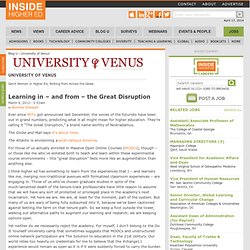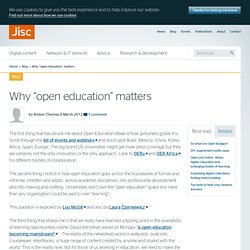

GoodSemester. Could Many Universities Follow Borders Bookstores Into Oblivion? - Wired Campus. Atlanta — Higher education’s spin on the Silicon Valley garage.

That was the vision laid out in September, when the Georgia Institute of Technology announced a new lab for disruptive ideas, the Center for 21st Century Universities. During a visit to Atlanta last week, I checked in to see how things were going, sitting down with Richard A. DeMillo, the center’s director and Georgia Tech’s former dean of computing, and Paul M.A. Baker, the center’s associate director. We talked about challenges and opportunities facing colleges at a time of economic pain and technological change—among them the chance that many universities might follow Borders Bookstores into oblivion. Q. Mr. Q. Mr. Q. Mr. I think what you see happening now with the massive open courses is going to fundamentally change the business models. Learning in – and from – the Great Disruption.
Ever since MITx got announced last December, the voices of the futurists have been out in grand numbers, predicting what it all might mean for higher education.

They're calling it “The Great Disruption,” a brand name worthy of Nostradamus. The Globe and Mail says it's about time. The Atlantic is envisioning a post-campus America. For those of us actually enrolled in Massive Open Online Courses (MOOCs), though – or those like me who've enlisted both to teach and learn within these experimental course environments – this “great disruption” feels more like an augmentation than anything else. I think higher ed has something to learn from the experiences that I – and learners like me, merging non-traditional avenues with formalized classroom experiences – are engaging in. Yet neither do we necessarily reject the academy. MOOCs do disrupt business as usual, yes. Will these type of practice ultimately have an impact of the teaching and learning spaces of traditional institutions? Why “open education” matters. The first thing that has struck me about Open Education Week is how genuinely global it is.

Scroll through the list of events and webinars and you’ll spot Brazil, Mexico, China, Korea, Africa, Spain, Europe. The big brand US universities might get more press coverage but they are certainly not the only innovators or the only approach. Look to OERu and OER Africa for different models of collaboration. The second thing I notice is how open education goes across the boundaries of formal and informal, children and adults, across academic disciplines, into professional development and into making and crafting. Universities don’t own the “open education” space any more than any organisation could be said to own “learning”. This question is explored by Lou McGill and also by Laura Czerniewicz. The third thing that strikes me is that we really have reached a tipping point in the availability of learning opportunities online.